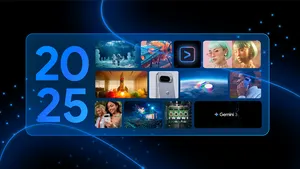“New normal” and other words we used a lot this year

There’s a lot to think about at the end of each year. What we accomplished, what we didn’t — what we made time for, or what we took a break from. At Google, the Search team looks at what sort of questions the world asked, and what answers we really needed. And of course, what momentary trends completely captivated us (looking at you, “tiktok pasta”).
As a writer, something I’ve been thinking about in the last few weeks of 2021 are the words we used this year. 2020 was the year of “now more than ever,” a phrase that began to feel meaningless as the “now more than ever”-worthy moments kept coming (and admittedly, as we all kept calling them that). If 2020 was the year of “now more than ever,” then what was 2021?

Once again, I turned to Ngrams, a Google tool launched in 2009 by part of the Google Books team. Ngrams shows how books and other pieces of literature have used certain words or phrases over time, and you can chart their popularity throughout the years. One caveat: Ngrams currently tracks data from 1800 to 2019 — prior to 2020, Ngrams’ data ranged from 1800 to 2012, but the team added a huge new dataset about two years ago. So while it remains to be seen how some sayings took over writing throughout 2020 and 2021, I wanted to see how the words we’re hearing and saying and writing today have shown up over time.
My first nomination: “new normal.” This is a phrase that I personally have heard…well, now more than ever, I suppose. This isn’t the first time “new normal” appeared in the lexicon, though: You can see it began to see small bursts of usage in literature and other writing in the mid-19th century — though if you use Ngrams to see some of the examples of how it showed up, “new normal” was often in reference to types of academic institutions. And then “new normal” just sort of faded away…until the aughts, when it dramatically rose. Michael Ballback, who works on Google Books, told me that a lot of post-2000s data added comes from e-books, whereas older data mostly came from libraries, so perhaps this could account for some of the jump. In any case, today it now completely permeates our writing. (Which raises the question: Is there such a thing as normal if they’re constantly new?)

Then of course, I thought of “vaccine,” which actually began its Ngrams debut on a high, falling sharply between 1800 and 1813…only to rise again in the early to mid 1900s, when many scholarly articles were published about things like typhoid, cholera and pertussis vaccinations. Then it goes up and down, up and down, to an all-time high in 2003. It’s since slightly fallen off — but remember, Ngrams’ data goes up until 2019, so I have my own assumptions about how it’s fared the past two years.
Google Books Ngrams Viewer chart showing the use over time of the phrase “vaccine,” which rises consistently beginning in 1900.

Lastly, I took a look at “hybrid.” Obviously it’s a word that’s been around for awhile (according to Ngrams, it’s been in use since at least the year 1800, which is how far the tool’s data goes back) and has gently, steadily risen since. It spiked in the early ‘80s, though, but in browsing snippets from Google Books from this time period, it was used similarly to how it is now. Later in the aughts, we start seeing it used to describe cars, and today…well, you probably already know.

What “hybrid” means hasn’t really changed, but it’s the situations we’re applying it to that have — there’s a much wider scope of daily life that falls under this category. “Hybrid” didn’t change, but how we live has. 2020 felt in many ways like a pause on life, and this year we began finding new, creative ways to adapt — a little of our old methods, mixed with the new. And that, to me, feels distinctly 2021.







